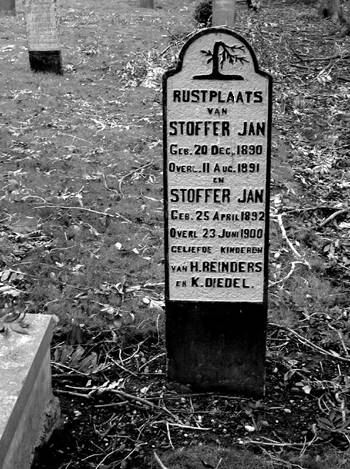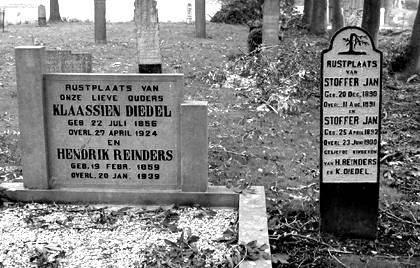
|
Present
Past
Subjects
Projects
Misc

|
THE LAST WILL AND TESTAMENT OF STOFFER JAN REINDERS
Project proposal for 'Kerken in het Groen: A Visual Arts Project for Churchyards'
"Thus I proceeded as my eyes of a man already dead registered the elapsing of that day, which was perhaps the last, and the diffusion of the night." (Borges)
Project Proposal
To produce the 'Last Will and Testament' of a person yet to be born. This person shall be known as 'Stoffer Jan Reinders' and the produced document 'The Last Will and Testament of Stoffer Jan Reinders.' The will shall incorporate a set of 'conditional bequests' providing for any number of individuals who agree to adopt the name 'Stoffer Jan Reinders' as their own name. Acceptance must be either by legal change or by adoption at birth ('Stoffer Jan Reinders' must be legally registered as the infant's proper name by the infant's parents). A gravestone bearing the name 'Stoffer Jan' is to be erected in the Woltersum churchyard in the province of Groningen. No one by the name of 'Stoffer Jan' must ever be buried there. A legal entity (a trust) is to be set up to manage the assets of the will's beneficiaries (all known as 'Stoffer Jan'). Photographs of both the gravesite in Groningen and a copy of the 'Last Will and Testament of Stoffer Jan Reinders are to be published and made available to the public both in print and over the internet.
Woltersum Churchyard

Stoffer Jan grave in the Woltersum churchyard. Photographed November 1, 2002. Translated inscription: "Resting place of Stoffer Jan born: 20 Dec. 1890 -- died 11 Aug. 1891 and Stoffer Jan born: 25 April 1892 -- died 23 June 1900. Beloved children of H. Reinders and K. Diedel"

The grave of Klaassien Diedel and Hendrik Reinders. Photographed November 1, 2002. Translated inscription: "Resting place of our dear parents Klaassien Diedel born: 22 July 1856 -- died 27 April 1924 and Hendrik Reinders born: 19 Feb. 1859 -- died 20 Jan. 1939"
Project Background
General Note -
The concept for the artwork brings together an interest in (1) names and identity, (2) the nature of cause and effect and (3) the role of the will as a legal instrument.
Stated clearly: the artwork here is the will. In respect to its creation there are still many decisions to make. Legal council and collaboration must be found. The concept is unusual, and from a legal perspective not unproblematic. The finished will must not only be upholdable in a court of law but also able to withstand legal contest. The drafting of this document is a creative exercise.
The finished will must be readable and interesting to non-specialists. It is possible that a narrative or narrative elements are incorporated within the document itself.
It should be noted that as envisioned the work proceeds through a number of distinct stages. (1) With the publication of the will the artist considers the artwork complete but not finished. (2) An indefinite period of time passes. (3) The will is recognized by its potential testator, who, after meeting its conditions, signs the document as their last will and testament. (3) If at the time of the testator's death the will hasn't been purposefully or accidently revoked by the testator (and reverted back to the start of stage 2) the will is probated. (4) The will reverts back to the start of stage 2.
A Note Concerning Causality -
Causality is an expression of cause and effect. We use causality in order to explain and understand our behavior. We inevitably look to the past for the reasons we feel and act the way we do.
Common sense dictates that causes are causes because they cause various effects (for example in Peter Fischli and David Weiss' 'The Way Things Go') and that effects always follow causes.
But is this true in all cases? Must the cause always come first and the effect after (following the direction of what we think of as 'forward flowing' time)?
Might not the cause of a current effect lie not in our past but in our future? For example in such a way that at the moment of the effect we can discover no apparent reason for what we are doing, thinking, feeling?
A Note Concerning Wills -
A will is desire, the will of the dead a set of commands issued from 'beyond the grave', prepared in life and perfected by death (Testamentum omne morte consummatur), expressed in ultimate absence.
Ironically it is often within ultimate absence that one is most respected, that one finds one's strongest voice. The will perfected by death commands, authorizes, is upheld and enforced by the law, "no power on earth can change it."
Ultimate absence is a timeless state. The condition of before or after life's moments.
Could a will herald or preceed the coming of a person, bring that person into being?
(Paul Perry, 22 January 2003)
ALAMUT.COM is artist owned and operated.
Mail: current address.

|

|


